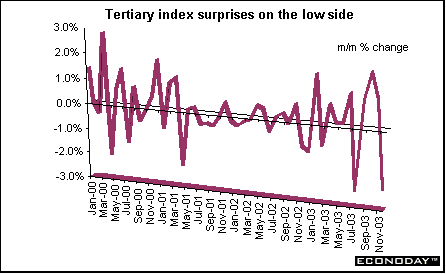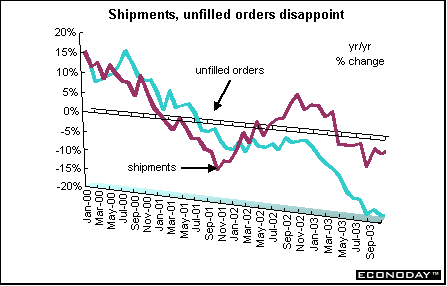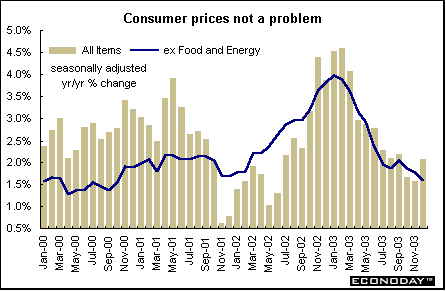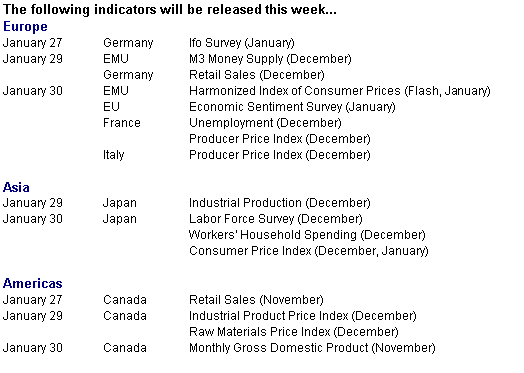Monday, January 26, 2004

Last Week's Highlights
Bank of Japan eases
The Bank of Japan's monetary policy board unexpectedly decided to raise the upper limit of its target for reserves available to lenders to �35 trillion ($326 billion) from �32 trillion. This was the first increase since October. The Bank also decided to keep monthly purchases of government bonds from lenders unchanged at �1.2 trillion. Since becoming governor on March 20, 2003, Fukui has raised the target five times from �20 trillion. Since rates are already at zero, the Bank has used the reserve target - the amount of money it makes available to lenders in the money market - as its main tool for adjusting monetary policy. BoJ governor Toshihiko Fukui said that the Bank was reinforcing its commitment to overcome deflation and protect the economic recovery. The Bank has promised to keep interest rates at zero until nationwide consumer prices stop falling for at least several months.

The decision (by majority vote) to add cash to the economy came just a couple of weeks before the G-7 finance ministers meeting. But governor Toshihiko Fukui told a press conference in Tokyo that the bank must watch currency moves because "they could become a downside risk for the economy." The yen's relentless rise could hurt the recovery by cutting exporters' sales, which accounted for two-thirds of Japan's third quarter economic growth. So far, the policy has failed to reverse a seven-year slump in bank lending because banks have chosen to invest the money in government bonds instead of taking a risk on loans to companies. Bank lending fell 4.4 percent in 2003.
Fukui may be under pressure from the government of Prime Minister Junichiro Koizumi, which needs a growing economy to win more seats in July elections for the upper house of parliament. As the upper house election nears, the government is likely to pressure the central bank to do more.
And so does the Bank of Canada
The Bank of Canada lowered its key interest rate to 2.5 percent. The Bank had previously reduced rates by 25 basis points in both July and September. The core inflation rate, at 1.8 percent, continues to be below the 2 percent inflation target. Although employment continues to grow, other sectors of the economy are being negatively affected by the increasing value of the Canadian dollar against the U.S. dollar and the lingering impact of the string of exogenous events that struck Canada throughout 2003 (SARS, mad cow and Ontario blackout).

The surge in the Canadian dollar against its U.S. counterpart, which has been fuelled in part by the wide interest rate differential between the two countries, has affected exporters especially. The currency is about 18 percent higher than it was at this time last year. And since its record low of 62 cents in January 2002, the Canadian dollar has soared to almost 79 cents, an increase of 27 percent. After the announcement, the currency eased to a shade over 76 cents. While much of the appreciation reflects the weak U.S. dollar, the Canadian currency has also been enhanced by relatively lofty domestic interest rates and a strong advance in the prices of metals and other commodities that make up a sizable portion of Canada's exports.
Until recently, the Bank of Canada had been optimistic that the erosion in export profits caused by the strengthening currency would be more than offset by growing demand from the United States that would pull Canada's economy along with it.
Confusing rhetoric addles currency traders
The currency markets dominated the economic news as the euro continued to shoulder the dollar's weakness. The euro gained against the dollar as investors bet the European Central Bank would not take action to stem the single currency's rise until it climbed well above the $1.30 level. The gains came after the ECB's monthly bulletin spelled out the bank's concern over currency volatility but showed no sign it might change its outlook for a gradual economic upturn in the eurozone. In contrast to strong "verbal intervention" of the previous week, the bulletin raised uncertainty whether the ECB would indeed take action. Traders are testing the ECB's resolve to keep the euro below $1.30. The currency's record high is $1.2899, which was reached on January 12th.

Global Stock Markets
The prospect of the Year of the Monkey sent stocks in Hong Kong, Singapore and South Korea skyward in their abbreviated trading week. But stocks that didn't beat earnings expectations continued to be ruthlessly sold by investors. On the week, only three indexes ebbed lower - the FTSE, Dow and Nasdaq.
Global Stock Market Recap

Europe and Britain
The FTSE slipped on the week thanks to a strong preliminary GDP report that, in analysts' minds, make a February interest rate increase virtually a sure thing. The strong GDP report combined with an exuberant retail sales report (see indicator scoreboard below) showed that the British economy continues to outpace the EMU economy by a large margin. Interest rate sensitive stocks pulled the FTSE down. In theory, an interest rate increase would make consumers more reluctant to borrow. But while stocks did not benefit from the GDP report, the pound sterling did. It bounced even higher on Friday after spending the week above the $1.82 mark.

Both the CAC and DAX were up on the week as investors remain optimistic that global economic growth will lift corporate profits. Shares of economically sensitive companies such as Siemens, Germany's largest electronics company, and ASML Holding NV led the gains, while those whose earnings aren't linked as directly to the economy trailed.
Asia/Pacific
Many Asian markets closed to celebrate the Year of the Monkey on Thursday and Friday. But pre-holiday trading especially in Hong Kong expressed optimism for the New Year. The Hong Kong Hang Seng bounded ahead by 4.4 percent on the week while the Singapore Straits Times jumped 2.9 percent. The South Korean Kospi was up a not too shabby 1.6 percent in just 2 days of trading.
Japanese stocks rose for the fifth week in six. Technology companies such as Sony Corp. gained on optimism that they will report good earnings. The Topix index was up thanks to banks. For the week, the Nikkei rose 2 percent and the Topix added 1.7 percent. Eighty-one companies in the 153-member Topix Electric Appliances Index, including Advantest, Sony and Fanuc Ltd., are scheduled to report earnings in the coming week. Banks paced gains in the Topix on speculation the value of their equity holdings in other companies will have increased in this year (ending on March 31, 2004), helping to bolster their earnings. The Topix has gained 36 percent since the last business year ended in March 2003, when it was near an almost two-decade low.

Indicator scoreboard
EMU - November industrial output edged up 0.1 percent and 1.2 percent when compared with last year. While output increased in Ireland, Germany, Finland, Belgium, Italy and Spain, it declined in the Netherlands, Luxembourg, Portugal and France. Output fell in the energy and durable consumer goods sectors but was up for capital goods and nondurable consumer goods on the month.

November merchandise trade surplus dropped to �5 billion from �9.6 billion surplus in October. Exports dropped by 6 percent while imports sank 2 percent when compared with November 2002. The data show that the euro's rising value has started to make a dent in EMU exports.

December harmonized index of consumer prices (HICP) was up 0.3 percent and 2.0 percent when compared with last year. The HICP is the ECB's inflation target. Excluding energy, food, alcohol and tobacco, it remained at 1.6 percent on the year. Excluding energy and unprocessed food, the ECB's preferred core measure of HICP was up 1.9 percent on the year. The monthly increase was due to higher prices for services such as package vacations, accommodation services and passenger air travel. These increases were partially offset by lower prices for communication, clothing, and motor and heating fuels.

Germany - January ZEW sentiment index on the German economic outlook among financial experts slipped to 72.9 from December's reading of 73.4. The survey is conducted by the Center for European Economic Research (ZEW) in Mannheim. The index had risen in 11 of the 12 previous months. The ZEW surveyed 310 German financial experts between December 22nd and January 19th for their opinions on current economic conditions and the economic outlook for major industrial economies.

December producer prices were unchanged but up 1.8 percent when compared with last year. Excluding energy, the PPI was unchanged on the month and up 0.2 percent on the year. Energy prices were up 0.3 percent and 8 percent on the year. Prices were down for the food producing and processing sector as well as for consumer goods. Capital goods prices were unchanged on the month and inched up 0.1 percent on the year.

France - December seasonally adjusted consumer spending on manufactured goods edged up 0.2 percent and was up 0.9 percent when compared with last year. Weak clothing and other sales offset most of the rebound in autos. Disappointing drops household equipment and clothing confirmed retailers' reports of lackluster holiday shopping.

Italy - November industrial orders sank 3.8 percent when compared with last year. Domestic orders dropped 4.6 percent while foreign orders were down 2 percent. Eight of 10 product sectors were down. However, November seasonally adjusted orders jumped 2.2 percent on the month. Domestic orders account for around 62 percent of the overall index, with foreign orders making up the rest.
November world merchandise trade surplus declined to �192 million from a surplus of �437 million in November 2002. Imports sank 6.6 percent while exports plummeted 7.5 percent. The data suggest that the stronger euro is weighing on Italian exporters.
November retail sales were down 3.1 percent and sank 0.9 percent when compared with last year. Non-food sales were down 2 percent on the year while food sales, which account for about 43 percent of the index, were up 0.9 percent. ISTAT officials tend to place more emphasis on the year-on-year series in presenting the data.
Britain - December consumer price index was up 0.4 percent and 1.3 percent when compared with last year. This is well below the Bank of England's new inflation target of 2 percent. The all services item index was up 0.7 percent and 2.8 percent on the year, while the all goods index was flat on the month and down 0.1 percent on the year. The former inflation target number - RPIX - was up 0.2 percent and 2.6 percent on the year.

Fourth quarter gross domestic product (first estimate) was up 0.9 percent and 2.5 percent when compared with the same quarter a year ago. Services were up 1 percent and jumped 2.6 percent on the year. Sector data are mostly unavailable with the first estimate. National Statistics estimated that manufacturing growth picked up and government and personal services were up at rates similar to recent quarters.

December retail sales volumes jumped 0.9 percent and 4.0 percent when compared with last year. Household goods increased by 1.8 percent and soared 8.7 percent on the year. Non-food sales were up 1.3 percent and 7.1 percent on the year.

Asia
Japan - November seasonally adjusted tertiary activity index dropped 2.3 percent but was 0.6 percent above the November 2002 level. The tertiary index reflects activity in six industries: utilities, transport and telecommunications, wholesale and retail, finance and insurance, real estate and services. Utilities rose, while wholesale and retail sales, transport, and finance and insurance declined. The broader all industry index fell 1.3 percent on the month. The all industry index takes a reading of activity in the six industries that comprise the tertiary index combined with activity in the construction, agricultural and fisheries industries, the public sector and industrial output. This index is considered a close approximation for gross domestic product growth as measured by industrial and service sector output.

Americas
Canada - November factory shipments sank 0.5 percent and were down 2.7 percent when compared with last year. Motor vehicle manufacturing dragged down total shipments for the second consecutive decline. Excluding the recently volatile motor vehicle and parts industries, shipments edged up a modest 0.1 percent. Nine of the 21 manufacturing industries, accounting for 57 percent of total shipments, posted declines. Although the majority of manufacturers reported higher shipment activity during the month, most increases were modest. Motor vehicle shipments sank 3.6 percent as some assembly plants were temporarily closed for retooling, while others faced production slowdowns for inventory control measures. Unfilled orders were down 0.8 percent to the lowest level in over six years. Contract cancellations and continued weak sales were reported by some industries, as the Canadian dollar soared to a 10-year high during the month. However, new orders were up by 1 percent for the fourth time in the last six months. The increase was widespread and included plastics and rubber products, as well as machinery and computers.

December consumer price index inched up 0.1 percent and was up 2.0 percent when compared with last year. On a seasonally adjusted basis, the CPI was up 0.4 percent and 2.1 percent on the year. Most of the increase in the 12-month change was due to a refund given to many Ontario electricity consumers in December 2002, causing the average bill in December 2003 to be significantly higher than the December 2002 bill. The CPI excluding energy, which excludes the impact of the electricity refund, rose 1.7 percent on the year. The all items index excluding the eight most volatile components, as defined by the Bank of Canada, rose 2.2 percent on the year.

Bottom line
The Federal Reserve Open Market Committee meets on Tuesday and Wednesday this week. While no interest rate policy change is anticipated, Fed watchers will be waiting to parse the announcement's text. This week also brings the release of a number of key indicators in the U.S. and abroad. The U.S. will release its first estimate of fourth quarter 2003 gross domestic product while Japan will release industrial production and labor market data.
Currency market players will continue to focus on euro rhetoric ahead of the ECB's February 5th meeting, which precedes the Boca Raton Group of Seven meeting on the weekend. Judging by this past week, currency investors are not convinced that the ECB would try to stop a new upward bolt in the euro.
Looking Ahead: January 26 through January 30, 2004




